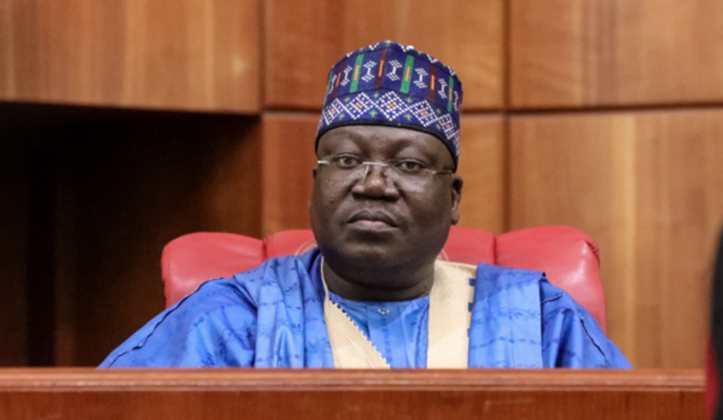
The National Assembly is divided over the ruling of a Federal High Court in Abuja that stopped the President, Major General Muhammadu Buhari (retd.); Minister of Justice and Attorney-General of the Federation, Abubakar Malami (SAN); and the parliament from tampering with the Electoral Act, 2022.
While the Senate insisted on going ahead to consider the request by the President, who asked the parliament to delete Section 84(14) of the new electoral law, the House said it would obey the court ruling.
The President of the Senate, Ahmad Lawan, at the plenary on Tuesday, stated that the ruling of the FHC negated the principles of separation of powers.
However, the Chairman of the House Committee on Media and Public Affairs, Benjamin Kalu, while addressing journalists on Tuesday, stated that the chamber would obey the rule of law principle.
The President had last week officially conveyed to the National Assembly his reservation about Section 84 (12) of the Act and asked the lawmakers to delete it.
The section read in part, ‘No political appointee at any level shall be a voting delegate or be voted for at the convention or congress of any political party for the purpose of the nomination of candidates for any election’.
Justice Inyang Ekwo, in a ruling on an ex parte application filed by the Peoples Democratic Party, agreed that the Electoral Act had become a valid law and could not be tampered with without following the due process.
The judge also held that the proper place to challenge the validity of any existing law was a court of competent jurisdiction.
Judiciary can’t stop legislature from working – Lawan
At the plenary on Tuesday, Lawan stated that the ruling would not stop the National Assembly from amending the Electoral Act.
As the amendment bill scaled first reading, the Senate President argued that the ruling violated the provisions of the 1999 Constitution on the separation of powers.
Lawan stated, “I find it necessary to talk about this at this point, because our governance system is based on the presidential system of government, where there is clear cut separation and exercise of powers.
“The judiciary, under no circumstance, cannot stop the National Assembly from performing its legislative duties. We know what our due processes are, just like we wouldn’t venture into what the judiciary does, and it should also understand that we have our processes.
“If the President writes to the National Assembly to request an amendment, that is within his powers and it is for the National Assembly to decide whether or not it agrees with the request of Mr President.
“But to say that we cannot consider it is to ask for what is not there to be given. I believe that the members of this National Assembly know their work and will do what is right.”
The Senate President stressed that Buhari and the lawmakers were not doing anything outside of the law, adding that the National Assembly was ready to take in and consider the President’s request.
According to him, it is within the parliament’s exclusive right to consider whatever request it receives from Nigerians.
PDP senators disagree on court ruling
Raising a point of order after Lawan’s comments, Senator Gabriel Suswam, faulted the judgment of the court.
Suswam stated, “I agree with what you (Lawan) have said; the court cannot stop us from making laws. The problem with the letter sent to us by the President is that there was a part of it that interpreted the law we made.
“I think that is the only part that the court can act on, because he (Buhari) said that the law we made is ultra vires to the constitution, which was not his responsibility; and I think, to that extent, the court can comment on that and not on the fact that we are making laws.”
However, a former Deputy President of the Senate, Ike Ekweremadu, raised a point of order and cited Order 52(5) of the Standing Orders of the Senate, calling on the chamber to obey the court ruling.
Ekweremadu stated, “When we were waiting for the President to assent the Electoral Act, some of us made a suggestion that we believed would help, namely that the President would sign and then we would commit ourselves to amending that section.
“I also offered to help in redrafting it. Now, we have a situation where they have told us that there is a judicial restriction on us to do that.
“I agree with you entirely, but the principle, as all the lawyers here know, is that if there is a court order, no matter how wrong it is, our responsibility as individuals and citizens is to respect it. The argument you have raised is what we are going to raise in response.”
Lawan, in his ruling, stated, “This has nothing to do with what happens in the court.”
We’ve been served court process, says Gbajabiamila
The Speaker of the House of Representatives, Femi Gbajabiamila, summarised the content of the President’s letter, especially as it concerns Section 84(12) of the Act.
He stated, “That letter is from Mr President. We will send it to the appropriate quarters – the committee – to look into it. Unfortunately, there has been a lot of misunderstanding as to the provisions of Section 84(12). I will not go into that now, but the understanding that people have out there is not exactly the import of Section 84(12).”
A member of the House, Herman Hembe, raised a point of order to warn the House against ignoring the court ruling.
In his ruling, Gbajabiamila said, “You are talking about the court process that was served on us. Yes, I am aware that there is a court process or an injunction on it, but I am still obligated to read the letter – the communication from Mr President – on the floor. Your point is well noted.”
While answering questions at a press briefing after the plenary, the House spokesman, Kalu, stated that the chamber would obey the court order as it was the position of the law and it ought to be respected.
According to him, the situation is interplay of the three arms of government.
Copyright PUNCH.
All rights reserved. This material, and other digital content on this website, may not be reproduced, published, broadcast, rewritten or redistributed in whole or in part without prior express written permission from PUNCH.
Contact: [email protected]





